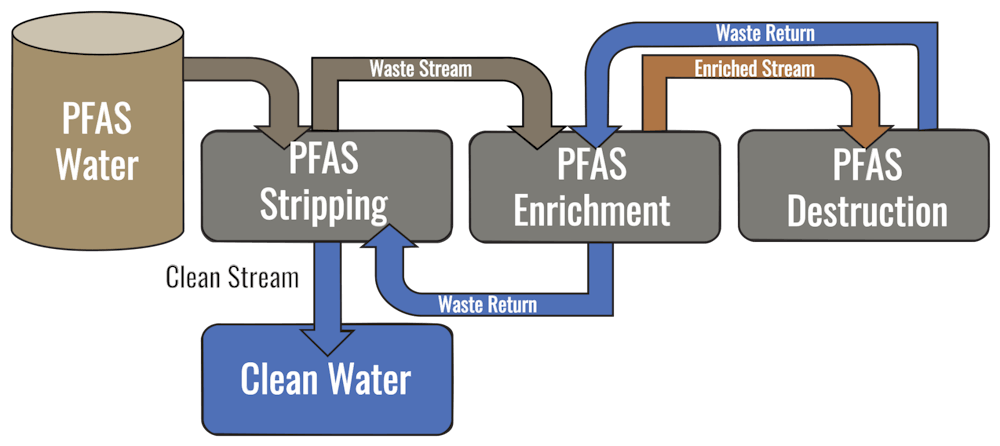Invicta Water, a private water treatment company, is working to remove PFAS from water sources along with the help of Elon students.
Elon and its surrounding area has recently faced multiple chemical leaks into nearby water sources such as the Haw River. Additionally, drinking water in the Alamance County area has PFAS levels higher than the Environmental Protection Agency recommends.
Per- and polyfluoroalkyl substances — otherwise known as PFAS — is a group of chemicals that is used in products that resist heat, oil, stains, grease and water. PFAS is a rising threat in the world of water contamination due to its dangerous potential to leak into water sources and its ability to not break down in the environment, according to the Centers for Disease Control and Prevention. According to the CDC, PFAS may affect reproduction, thyroid function, the immune system and injure the liver.
Invicta, founded in late January of 2023, started because of a personal experience with the dangers of PSAS. The founder of the company, Steve Wilcenski, lost his sister to breast cancer and said he suspects the cancer was a result of PFAS contamination. According to Wilcenski, she was married to a Marine and spent many years living on military bases with contaminated water. According to cancer.org, the International Agency for Research on Cancer classified PFOA — a form of PFAS — as a possible human carcinogen.
Elon associate professor of chemistry Justin Clar said he is concerned about the threat of PFAS.
“PFAS is a serious problem. It is ubiquitous in the environment. It's in our bloodstream,” Clar said.
The EPA’s 2022 interim Health Advisory divides PFAS into four groups: PFOA, PFOS, GenX chemicals and PFBS. The advisory outlines a proposed drinking water regulation for these groups. For PFOA it is a maximum of 0.004 parts per trillion, 0.02 ppt for PFOS, 10 ppt for GenX chemicals and 2,000 ppt for PFBS.

Illustration of the three-stage filtering process. Stripping is where PFAS is separated from water, enrichment is what concentrates PFAS to reduce contaminated water volume and destruction is where PFAS molecules are destroyed before water returns to the next stage.
Wilcenski said Invicta uses cutting-edge technology to treat water in ways that aren’t used by many municipalities and much cheaper than the municipalities’ methods. The company uses boron nitride materials and nanomaterials combined with UV light to capture, remove, and destroy PFAS. This is completed through a three-step process of stripping, enrichment, and destruction, according to the company’s website.
Clar also works with Invicta as an advisor, and even has his students at Elon work with Invicta’s water treatment products. Clar and his students do much of Invicta’s analytical work and conduct proof-of-concept tests in Elon University labs for Invicta’s new products to help the brand-new company hit the ground running.
“It's kind of mutually beneficial because I have interesting products for my students to work on and they also are able to get some data and information that would otherwise be very expensive to develop,” Clar said.
Invicta’s development of new water treatment technologies is one potential solution of many that are currently being developed in the Alamance County area. Water Resources Director Bob Patterson said the town of Burlington officials are working on developing many potential solutions to the rising problem of PFAS.
Patterson said Burlington’s Water Resources department is investigating its sanitary sewer collection system and treatment plants to identify sources that discharge to the sewer collection system that have high levels of PFAS.
“We're in the process of hiring an engineering firm who will conduct a study to try to determine what PFAS sources may be in our drinking water reservoirs, and also concurrently look at what treatment measures we will need to install at each of the water treatment plants to reduce PFAS in the water that we produce and supply to our citizens in the surrounding communities,” Patterson said.
Alamance County has four water treatment plants, one of which Patterson said has high levels of PFAS in its water, including the JD Mackintosh Water Treatment Plant in Burlington. Patterson said the plant will soon require treatment optimization and some changes to its processes via a capital project that will likely cost around $40 to $60 million.
Patterson said in addition to their own initiatives, city officials have had discussions with Invicta Water and may partner in the future.
“We will probably be working with Invicta to do some testing,” Patterson said. “We've had some discussions with them.”
According to Patterson, once Invicta brings their product line to full scale, they will sell their technology to municipalities that have treatment plans and then a contractor will install it.
“Those are all kinds of cooperative efforts and their technology is promising,” Patterson said.
However, Invicta’s new way of eliminating PFAS from the water isn’t a solution to the entire problem. Although the EPA is starting to regulate PFAS, a total ban of the dangerous group of chemicals remains elusive.
“Until a ban takes place, no one will do anything,” Wilcenski said.
Clar said innovation is the key to solving this problem of PFAS contamination. Clar believes that the demand for clean water will drive the progression of innovation.
“It’s going to keep getting better because the public is going to demand it of their representatives to have clean water access and so then that will drive the innovation,” Clar said
Patterson said he is glad that companies such as Invicta are pursuing innovation in the water treatment world because unique solutions from private companies are broadening how municipalities can combat PFAS.
“That helps us as water suppliers and gives us more options to choose from sooner if their products work,” Patterson said.


